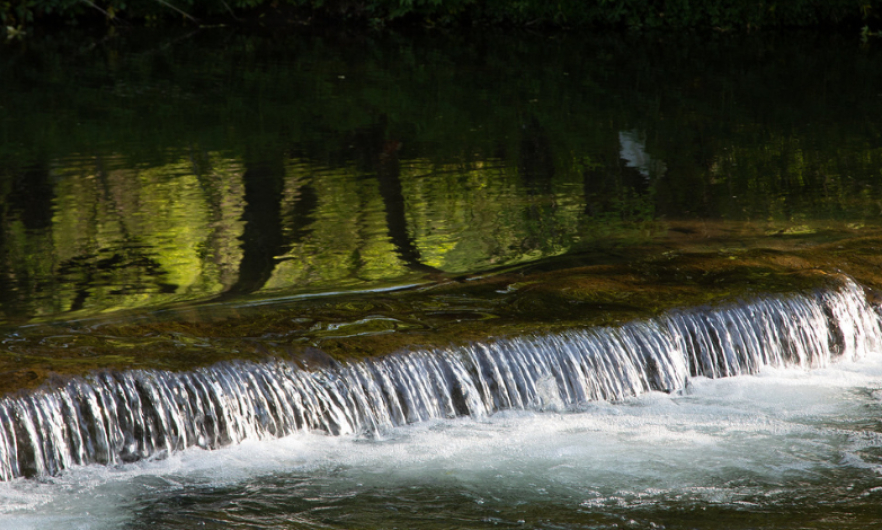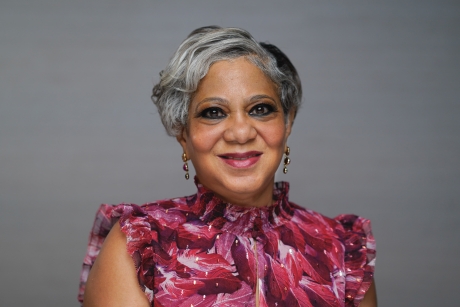Embrace the Healing Power of Nature
Letter from the Director

Herring Run Park in Baltimore. (Photo by Will Parson/Chesapeake Bay Program)
Embrace the Healing Power of Nature
Welcome to our Spring 2024 issue of Health Equity Happenings! It’s been a productive and successful season at the Johns Hopkins Center for Health Equity. Here are a few of the exciting things that have happened at CHE in the last few months:
I shared my insights into how health disparities impact public health outcomes in the PBS series The Invisible Shield. Public Health workers are the unsung heroes who have made our lives safer and healthier! You can watch the series online.
I was honored to be named a Master in the American College of Physicians, which was awarded in April 2024.
We were thrilled to host an outstanding lineup of speakers for our Jam Sessions throughout winter and spring. Our January through May webinars included Bunmi Ogungbe, PhD, MPH, RN; Michelle Albert, MD, MPH; Donald Warne, MD, MPH; Jessica Fanzo, PhD; and Clayton Yates, PhD. Topics ranged from professional journeys to indigenous health disparities, tumor biology, and the impact of climate change on our diet. Watch the available Jam Session recordings on the CHE YouTube Channel.
Congratulations to several CHE faculty members and affiliates who were lauded for their research and professional accomplishments this season. They include:
Michelle Ogunwole, MD, PhD, received a DiabDocs National K12 Physician Scientist Career Development Award from the National Institute of Diabetes and Digestive and Kidney Diseases.
Deidra Crews, MD, ScM, was awarded the 2024 Louis. W. Sullivan, MD Award for her research contributions addressing disparities in kidney disease and hypertension outcomes.
Chiadi Ndumelea, MD, PhD, MHS, published two landmark articles on preventive cardiology in the journal Circulation. The articles are “Cardiovascular-Kidney-Metabolic Health: A Presidential Advisory From the American Heart Association” and “A Synopsis of the Evidence for the Science and Clinical Management of Cardiovascular-Kidney-Metabolic (CKM) Syndrome: A Scientific Statement From the American Heart Association.”
Bunmi Ogungbe, PhD, MPH, RN, who joined our core faculty team.
Eliana Perrin received the 2024 Miller-Sarkin Mentoring Holistic Award for her exceptional contributions as a mentor to students and colleagues.
Seth Martin, MD, MHS, who was named president of the American Heart Association Baltimore and Greater Maryland Division Board. I was also honored to share my professional journey and the Center for Health Equity creation for Dr. Martin and colleagues at the AHA’s Strategically Focused Research Network Health Tech and Innovation event centered on digital health solutions.
Community Advisory Board member Alex Solano-Umano was honored with the 2024 Johns Hopkins School of Nursing Exceptional Community Partner in Research Award. Read about Solano-Umano’s work online in our blog article.
With our hectic and complicated lives, pausing to focus on our well-being can be challenging. Walking outside is one of my greatest and simplest pleasures, which I try to do several times a week. This time of year is especially nice for walks because the days are long, and I can walk in the evenings after work. In my neighborhood, I wear headphones and listen to music or call a friend and chat while walking. Other times, I crave peace and instead focus on the sky, grass, trees, or the chirping birds around me. Occasionally, I cross paths with a neighbor, and we will catch up on the latest community news. If I am away from home, I try to find a restorative location to stretch my legs.
Being outdoors has many benefits. In our fast-paced lives, it is essential to prioritize reconnecting with nature in any way you can. Beyond the aesthetic appeal, living near green spaces offers myriad health benefits that positively impact our physical, mental, emotional, and spiritual well-being. The soothing sights and sounds of nature can alleviate stress. Research has shown that exposure to green spaces can lower cortisol levels, reduce blood pressure, and promote relaxation. Strolling through a park or sitting beneath a canopy of trees can work wonders for calming the mind and body.
Green spaces play a role in cardiovascular health, and their role in providing a wonderful space for us to connect with family and friends, share a meal, and celebrate special moments is well documented. Looking at the ocean, standing at the top of a mountain, and hiking in the woods can also remind us of the vastness of our planet and the universe to which it belongs and provide a sense of awe regarding our place in both.
Recently, The Washington Post published an article featuring a tool that allows you to check any location’s proximity to nature. The not-so-surprising results indicate that city dwellers and people living in economically depressed areas have the least access to nature or safe places to enjoy the outdoors in any way. Among the five Social Determinants of Health, neighborhood and the built environment play a huge role in health equity. We must create and support programs that advocate for improving our neighborhoods and environments.
Here in Baltimore, Maryland, we have several large and small city parks—you can find one closest to you on the Baltimore City Department of Recreation and Parks website. We can also visit several large state parks, several rivers, the Chesapeake Bay, the mountains in the western part of the state, and the Atlantic Ocean to the east.
The Johns Hopkins Center for Health Equity and our collaborator, the Johns Hopkins Urban Health Institute (UHI) have partnered with and supported several initiatives that help Baltimore residents get out in nature and enjoy green spaces. These include:
Walk with a Doc
Our Baltimore area Walk with a Doc meets on the second Saturday of the month at 9 a.m. at Lake Montebello. CHE staff members Perri Carroll and Nicola Norman were involved in establishing our Baltimore Walk with a Doc program. These ongoing events allow participants to safely walk, learn about current health topics, and meet new people. This program is nationwide, so you may be able to find a walking group close to you. Physicians and other healthcare professionals interested in being a Walk with a Doc speaker can contact Kadija Hart at khart@backyardbasecamp.org.
Backyard Basecamp
Another former BNLP Fellow, Atiya Wells, leads the mission of Backyard Basecamp (which also supports Walk with a Doc). This program seeks to reconnect Black, Indigenous, and People of Color to the land and nature in Baltimore City. It offers urban environmental education, a community garden, health and wellness programs, a summer camp, and much more.
Plantation Park Heights Urban Farm
Plantation Park Heights is an urban farm that grows fresh produce that is available for free or at a low cost to the neighboring community. Founded by CHE Community Advisory Board member Richard Francis (aka Farmer Chippy), Plantation Park Heights also offers a place where individuals and families can connect with the earth and learn about urban farming practices.
Do you know of others? We would love to learn about them. Write to us at healthequity@jhmi.edu
Happy Spring/Almost Summer!

Lisa Cooper, MD, MPH
Director, Johns Hopkins Center for Health Equity
